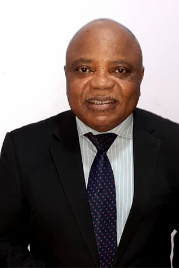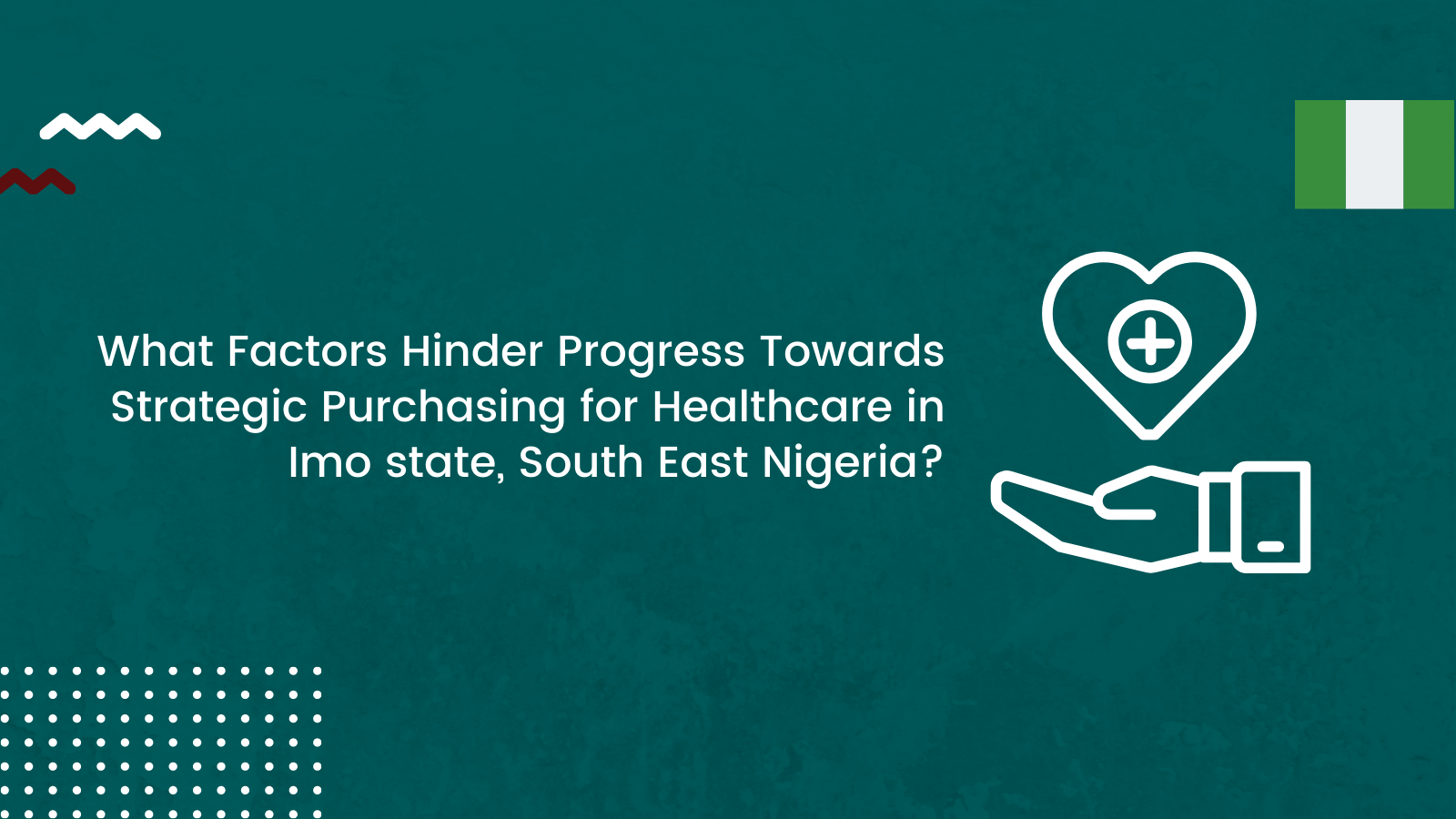As part of the global agenda to achieve access to efficient, equitable, affordable and quality healthcare to the population, countries have committed to attaining Universal Health Coverage (UHC). Strategic health purchasing (SHP), as a core function of healthcare financing, is critical to achieving UHC, linking resource mobilisation to pooling, ensuring efficient and equitable delivery of healthcare [1]. Strategic purchasing enhances improvement in the healthcare system by promoting quality, efficiency, equity and responsiveness of service delivery, thereby facilitating progress towards UHC [2]. Given the global focus towards SHP to achieve optimum health system performance [3], countries have committed to SHP, leading to health system reforms. Effective implementation of SHP requires putting in place structures and mechanisms that support activities that enhance improvement of system performance. However, evidence shows increasing challenges in implementing SHP in low and middle-income countries, ranging from unsatisfactory benefit packages, low service quality and challenges with provider payment mechanisms, making healthcare purchasing remain mostly passive [4, 5].
Tracking progress towards Strategic Health Purchasing in Imo state
Imo state is committed to achieving UHC as stated in the first Healthcare Financing Policy and Strategy. The strategy identifies SHP as a lever to achieve desired goals [6]. Out-of-pocket payments are high in Nigeria at approximately 76% of current health expenditure and there may be similar levels in Imo state. State resources pooled through the Imo State Ministry of Health (SMOH) represents the largest source of pooled funds. The state established its social health insurance scheme, Imo State Health Insurance Agency (IMSHIA), to improve pooling, equity and efficient healthcare delivery [6, 7]. The authors undertook an in-depth review of Imo state’s purchasing arrangements, to track progress and challenges in purchasing arrangements, identify factors that limit SHP implementation, and make recommendations to facilitate progress towards SHP. The authors identified several factors that undermine SHP objectives cutting across governance, institutional arrangements, purchasing functions and capacities for SMOH and IMSHIA. This blog lists key challenges that limit the implementation of SHP in the Imo SMOH, the dominant single purchaser in Imo state, and provides recommendations for improvement.
Challenges and recommendations for improving Imo SMOH purchasing functions
Weak government stewardship for Strategic Purchasing. Weak stewardship of the SMOH and weak regulatory and accountability functions has resulted in inadequate funding, poor delivery infrastructure, lack of adequate workforce, and insufficient accountability, which are essential for achieving SHP objectives. Imo state needs to strengthen its stewardship, regulatory and accountability roles in the health system, and regularly monitoring provider performance to ensure accountability in resource allocation and service delivery.
Public Integrated Purchasing system and lack of purchaser-provider split. The SMOH is both purchaser and provider and is not organizationally and functionally separate from its providers. The ministry does not perform its purchasing function of selective contracting of providers based on defined quality standards, which is an integral SHP function to incentivize efficient delivery of quality services [8]. The state needs to provide a clear system of contracting and monitoring provider performance for quality improvement [1].
Inadequate and unpredictable budget allocation for health. Adequate and sustainable funding for healthcare services is an enabler for SHP to achieve desired objectives. Sufficient and predictable funding facilitates the delivery of the defined benefits package and guarantees access to included services. Imo SMOH is characterised by low and unpredictable funding. Budget cuts and reallocations to other departments, worsens the situation. The need to increase funding for healthcare in Imo state cannot be over-emphasised if the government is desirous of achieving UHC.
Inadequate health service delivery infrastructure. This is reflected in the workforce shortages across cadres, insufficient public health facilities, and lack of essential health commodities, that result in substantial infrastructure gaps. This huge health infrastructure gap limits effective healthcare delivery in the state. This is attributed to poor prioritization in the budget process, low budgetary allocations and weak budget execution [6]. The government needs an investment plan and commit resources for health infrastructure development for effective healthcare delivery.
Ineffective provider payment mechanism. Providers are paid through monthly salaries and line-item budgets, which are not linked to performance or achievement of health system objectives. These payment systems undermine the purchaser’s leverage to provide appropriate incentives for quality improvement and efficient service delivery. There is need to review the provider payment mechanisms to incentivize performance, efficiency and accountability for quality.
Weak Health Management Information System (HMIS). Purchasing functions rely on a robust health information system for evidence-based decisions on purchasing functions of what to buy, from whom to buy and how to buy. Imo state relies on a paper-based system that uses registers for collecting data, linked to the DHIS2 system. Information generated through this system is not linked to purchasing decisions. SMOH needs an effective HMIS for purchasing functions to enhance evidence-based planning and decision making. The SMOH may start by identifying a few indicators collected through the DHIS2, and use these to track utilization that can inform what should be prioritized in the benefit package, and from whom these services should be offered and develop contracting arrangements based on quality requirements and linked to performance monitoring.
Poor monitoring of provider performance and accountability. While there are guidelines in place for monitoring the quality of care, implementation of quality assurance, provider performance and accountability mechanisms are weak. SMOH has guidelines for monthly and quarterly reporting of quantitative outputs, supportive supervision and appraisal of providers. Evidence shows poor or weak implementation of these guidelines, resulting in sub-optimal and varied quality of health services [6] attributed to a lack of funding for these activities. Prioritizing these activities as part of performance monitoring and linking the use of this information to purchasing decisions will support SMOH’s role as a strategic purchaser.
Inadequate SMOH institutional and technical capacity for SHP. This is a significant impediment to effective implementation of SHP. Provision should be made for regular capacity development of relevant stakeholders in healthcare purchasing. Collaboration with expert partners such as the Strategic Purchasing Africa Resource Center for technical support in this area could boost the capacity and implementation of SHP
Conclusion
Imo SMOH has limited capacity for SHP. The main challenges stem from weak governance and stewardship for healthcare purchasing and low capacity for implementing SHP. Appropriate legal and regulatory frameworks need to be put in place and enforced for SHP. Strengthening SMOH’s capacity is critical for effective implementation of Imo state’s health financing strategy among other recommendations presented in this blog to improve purchasing in the state.
References
- RESYST. What is strategic purchasing for health? Health financing research theme, Resilient and Responsive Health Systems (RESYST). 2014. http://resyst.lshtm.ac.uk/sites/resyst.lshtm.ac.uk/files/docs/reseources/Purchasing20brief.pdf.
- Figueras J, Robinson R, Jakubowski E, eds. Purchasing to improve health systems performance. Berkshire, England and New York, USA: Open University Press, 2005.
- WHO. Health systems: improving performance. The world health report, 2000.
- McIntyre D, Ranson MK, Aulakh BK, et al. Promoting universal financial protection: evidence from seven low- and middle-income countries on factors facilitating or hindering progress. Health Res Policy Syst 2013; 11:1–10.
- Etiaba E, Onwujekwe O, Honda A, et al. Strategic purchasing for universal health coverage: examining the purchaser–provider relationship within a social health insurance scheme in Nigeria. BMJ Glob Health 2018;3: e000917. doi:10.1136/bmjgh-2018-000917
- Imo State Ministry of Health; Imo State Health Financing Policy & Strategy (ISHFP&S) 2019
- Imo State of Nigeria; Imo State Health Insurance Agency (IMSHIA) Act 2018
- Mbau R, Barasa E, Munge K, Mulupi S, Nguhiu PK, Chuma J. A critical analysis of health care purchasing arrangements in Kenya: A case study of the county departments of health. Int J Health Plann Mgmt. 2018;33:1159–1177. 10.1002/hpm.2604 [PMC free article] [PubMed] [CrossRef]
Authors profile

Dr. Charles Ezenduka is a senior lecturer in the Department of Health Administration & Management College of Medicine, University of Nigeria, Enugu campus.

Eric Obikeze holds M.Sc in Economics, M.Sc in Health Policy, Planning and Financing and PhD in Health Economics. He is a lecturer in the Department of Health Administration and Management and aResearch Associate with Health Policy Research Group both in the College of Medicine, University of Nigeria, Enugu Campus. His specializes in economic evaluation, health financing and equity analysis.

Benjamin S.C. Uzochukwu is a Public Health Physician at the University of Nigeria Teaching Hospital Enugu and Professor of Public Health, Health Policy and Systems, University of Nigeria, Nsukka where he was the founding Director of the Institute of Public Health. He is the National President of the Association of Public Health Physicians of Nigeria (APHPN), Director of Grants and Research West African College of Physicians (WACP) and member of the Ministerial Expert Advisory Committee on COVID-19 Health Sector Response (MEACoC).

Obinna Onwujekwe is a Professor of Health Economics, Systems and Policy, and the Director of the Directorate for Research in University of Nigeria, Nsukka. He is the founder and Director of the Health Policy Research Group, which is a renowned and reputable research organization. He has led the development of many health policies in Nigeria, including the National Health Policy (2016) and the National Health Financing Policy (2016). He has served on the scientific and advisory boards of the African and International Health Economics Associations, and is the foundation president of the Nigeria Health Economics Association. He currently chairs the Health Technology Assessment and Logistics subcommittee of the Ministerial Expert Advisory Committee on COVID-19 Health Sector Response (MEACoC). He is a Fellow of the Nigerian Academy of Science.

